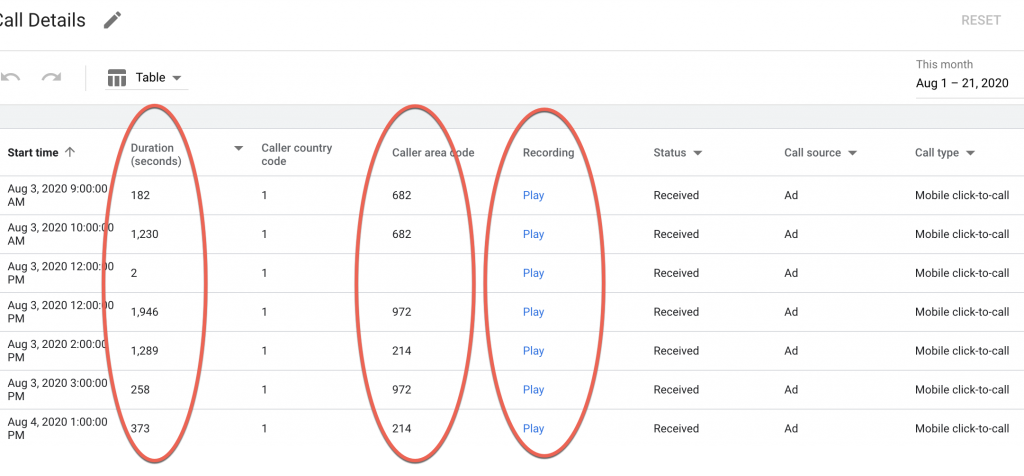It’s easy to get stuck in a routine with your B2B PPC program.
You monitor your paid search campaigns and optimize them. And they seem to be working well.
So why change anything?
In short, the reason is that you don’t know what you might be missing.
Without question, lots have changed this year (to put it mildly). And I’m sure these changes have impacted your industry, business, and competitors.
We’ve also seen plenty of changes in online advertising networks with lots of new functions and changes to existing functions.
If you’re still using the exact same strategies you were deploying in December 2019 – without testing other options – the new year is the perfect time to try something new.

Not sure where to start?
Here are my top picks:
1. Call Recording
I wrote about call recording in an earlier article.
But I can’t stop talking about it because we’re able to get such good insights from it.
If your product or service is expensive, complex, or sensitive, most people won’t convert online. They want to have a conversation first.
So you use call ads and call extensions to get them to call.
But then what typically happened?
You could see the number of calls and their duration in Google Ads. But you had no idea what was said or what happened next.
Were these callers good leads? Did they eventually lead to a sale?
You had no way to know without listening to the call.
Consequently, many advertisers opted to implement third-party call tracking systems. Other advertisers decided to stay away from call ads and call extensions altogether, which was a shame.
These third-party call tracking systems often worked well, but they were just one more thing to learn, set up, and manage. But now, Google Ads has a call recording option so you can listen to these calls while staying within the Google ecosystem.
Here’s an example of what you’ll see in your Google Ads account with call recording:

You’ll see the duration of each call as well as the country and area code of the caller. Simply click “Play” to listen to the recording.
Having this option is a major boon to a lot of businesses – especially those in competitive industries paying top dollar for keywords.
(Side note: Make sure you’re in compliance with regulations about recording calls. Most jurisdictions require that you notify the caller that the call may be recorded.)
2. Audience Targeting
I hate to say it, but it’s true.
Some businesses continue to rely on keyword-only targeting strategies in their PPC advertising. We know this because we see it when we take on new clients and have a look at their accounts.
I get it.
If your keyword-only strategy is working, why change it?
But again, you don’t know what you might be missing. For the sake of argument, let’s say I convince you to go beyond keyword-only targeting.
Where do you turn?
One of the first options I would consider is audiences.
Audiences, especially when combined with keywords, are a powerful tool. They’re also easy to test if you’re not ready to jump in with both feet.
One tip: Don’t limit yourself to audience groups that are obviously relevant.
Also, consider semi-relevant and even long-shot audience groups. Add these audiences in observation mode and see what works. If you find something that looks promising, increase your bid by 10% or so.
We’ve been pleasantly surprised at how semi-relevant and long-shot audience groups can pay off.
For example, we have a nonprofit client that fundraises to support people with cancer. We’ve taken some of their keywords, and combined them with the audience group “avid investors,” and gotten excellent results.
Why does this combination work?
We’re not sure. Maybe those who invest are also more inclined to give to this cause?
We don’t know.
But we’ll take it, nonetheless.
3. Remarketing & Customer Match
Remarketing and customer match are also great strategies to explore in the new year. But sometimes, advertisers confuse the two.
Remarketing puts your ad in front of people who’ve visited your website. Customer match lets you use your existing customer list (often your email list) to reach people on your list across a handful of networks, including Search, Display and YouTube.
We’ve had good success with remarketing and customer match on both the search and display networks – although we find that customer match tends to outperform remarketing.
So you might want to start there first.
4. Dynamic Search Ads
Dynamic search ads use your website content to target your ads and fill in gaps in your keyword-based campaigns. You get to choose the webpages, landing pages, and categories of pages that Google will use to generate dynamic search ads.
Make sure you choose pages that are content-rich and consistent (i.e., not frequently updated, such as event or daily deal pages).
Google does a surprisingly good job of creating long-tail targeted keywords on dynamic search ads, which is why they’re my team’s favorite type of campaign this year. They’re the top-performing ad type in many of our client accounts.
Again, this is something you need to test before going all in.
Because while we’ve gotten great results with this ad type in some accounts, they haven’t taken off in other accounts for indiscernible reasons.
5. Bumper Ads
No list of new things to try in your B2B PPC programs would be complete without a mention of bumper ads. Bumper ads are short, six-second video ads that can’t be skipped.
Six-seconds may sound awfully short.
And it is!
Which is why you can’t just launch one bumper ad and expect it to do anything. Instead, you need to use them in clusters, combine them with other ad formats, and make them very narrow in focus.
These ads take a bit of work. But if you already have some video assets at your disposal, this one is worth a try.
Stretch Yourself in 2021
Don’t let another year pass by without trying something new in PPC.
Because while your current PPC program might be performing “just fine” for your B2B business, you might be missing out on a strategy or function that can reap deep rewards.
So give these five strategies a try (even if it’s just in observation mode) and see what happens.
This article was originally published on Search Engine Journal.






